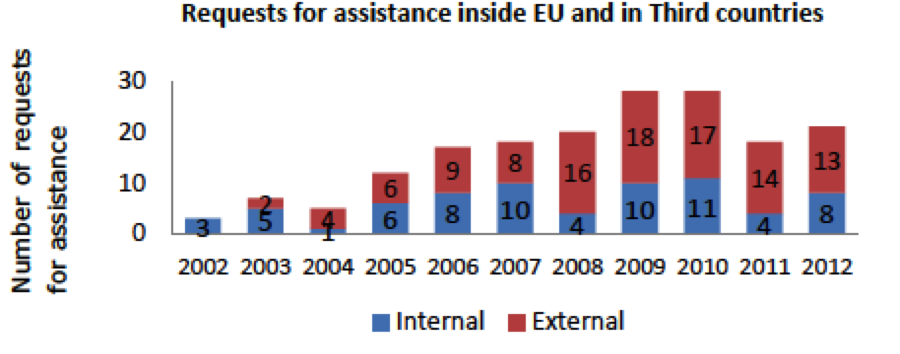The Philippines were hurt by one of the strongest typhoons ever recorded. Typhoon Haiyan hit a highly populated area of the Philippines on November 7th and 8th. Apparently an estimated 10 millions people were affected by the Typhoon, and almost 3 million people have lost their livelihood. The death toll stood at 3,974 and over a 1,000 missing, and the devastations are serious – as demonstrated by Marine Brig. Gen. Paul Kennedy –.
The Philippines is facing serious challenges following the massive devastation such as seeking for survivors, providing clean water, emergency food supply, avoiding massing looting, and providing shelter for displaced persons. The devastations are such that the President Benigno Aquino has even planned to start a program offering food or cash to people helping in the cleaning process and clearing roads.
The excellent map (below) developed by the European Commission illustrates the challenges across the many islands of the Philippines.
The EU foreign policy chief, Catherine Ashton, released a short statement on November 10th wherein she expressed her sadness and underlined that the civilians can “count on the solidarity and assistance of the European Union.” So far only the European Commission has announced that it will be releasing a fund of “€3 million available to help the
international emergency relief efforts.” To this fund, the European Commissioner for International Cooperation, Humanitarian Aid and Crisis Response, Kristalina Georgieva (picture to the right), has announced during her visit to the country that an additional €7 million will be delivered.
This emergency fund comes in parallel with the activation of the EU Civil Protection Mechanism (EUCPM), which was released by Commission in order to coordinate European relief efforts. In addition the European Commission’s Emergency response Coordination Centre (ERCC), which was launched in 2013, is in charged of monitoring the situation and has already sent experts on the ground.
The EUCPM was created in 2001 with the primary responsibility to deal with immediate effects of a disaster. This mechanism has for goal to assist national authorities overwhelmed by the disaster. As illustrated by the two charts below, all 28 EU Member States + four non-EU are contributors to the EUCPM. According to the Commission “Any country in the world can call on the EU Civil Protection Mechanism to help.” In term of spending and costs, the assistance by the EU is free of charge as a “gesture of solidarity.”

Source: European Commission. “Humanitarian Aid and Civil Protection” (http://ec.europa.eu/echo/policies/disaster_response/mechanism_en.htm)
According to the European Commission, since the creation of the EUCPM in 2001, it has been activated over 150 times following major disasters such as the Tsunami in South Asia (2004/2005); Hurricanes Katrina and Rita in the USA (2005); earthquakes in China (2008), Haiti (2010), Japan (2011); floods in the Balkans (2010); forest fires in Greece (2007, 2012); civil unrest in Libya (2011); explosion at a naval base in Cyprus (2011); and now the Philippines.

Source: European Commission. “ECHO Factsheet EU Civil Protection” (http://ec.europa.eu/echo/files/aid/countries/factsheets/thematic/civil_protection_en.pdf)
So far several individual EU Member States have already been involved such as Belgium, the Netherlands, the UK, Ireland, Germany and France. As reported by Bruxelles2, each Member State is contributing to the emergency by releasing financial emergency fund, providing human and material assistance. In addition, international assistance has already been launched counting Russia, the US and Canada.
As of today, the overall contribution of the EU is around €20 million, composed of
– €3 million of emergency humanitarian aid
– €10 million of reconstruction assistance pledged
– and the €7 million in humanitarian aid
The Member States have so far contributed around €25 million in financial aid plus human and material support already on the ground.
Typhon Haiyan shall seriously be taken by the EU for several reasons. First, the human tragedy is great. Second, such catastrophe falls under the concept of human security, a dimension consistently promoted by the EU. Ashton got seriously criticized for not going to Haiti after the disastrous earthquake back in 2010. She later replied to her critics by arguing that she was not interested in ‘catastrophe tourism.’ With the EU as one of the largest global donor in aid, the presence of its top officials is more a question of visibility than tourism. Ashton’s presence in the Philippines will have to occur at some point in time. The question of climate change is directly incorporated in the 2008 European Security Strategy as one of the main threats to European security. In the 2008 ESS, it is written that
“the climate change is a ‘threat multiplier.’ Natural disasters, environmental degradation and competition for resources exacerbate conflict, especially in situations of poverty and population growth, with humanitarian, health, political and security consequences, including greater migration. Climate change can also lead to disputes over trade routes, maritime zones and resources previously inaccessible.”
The super-typhoon devastating the Philippines fits into the broader narrative of climate change and global warming advanced by the Union. The EU and its Member States are in a first time addressing the challenges on the ground and assisting population in need. In a second time, the EU will have to continue pushing for ‘real’ negotiations leading to a binding agreement addressing climate change counting most nations of the developed world. As it is argued in the 2008 ESS, “International co-operation, with the UN and regional organisations, will be essential.”